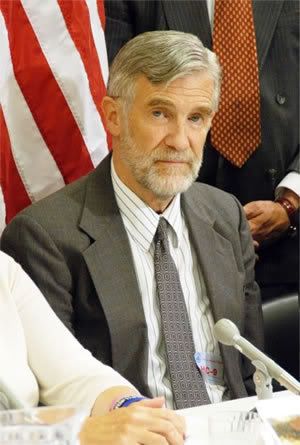The most recent previous step along Bush's plan to go to war in Iran was getting a unit of Iran's military designated as a terrorist organization by the U.S. Senate. That secured, and under cover of California's catastrophic fires, Bush submitted a supplemental appropriations bill and used his bully pulpit to turn up the pressure on Congress to pass it, when there is no immediate need to do so. Congressional Quarterly reports:
Some Democrats are worried that President Bush’s funding request to enable B-2 “stealth” bombers to carry a new 30,000-pound “bunker buster” bomb is a sign of plans for an attack on Iran.
Buried in the $196.4 billion supplemental war spending proposal that Bush submitted to Congress on Oct. 22 is a request for $88 million to modify B-2 bombers so they can drop a Massive Ordnance Penetrator, or MOP, a conventional bomb still in development that is the most powerful weapon designed to destroy targets deep underground.
A White House summary accompanying the supplemental spending proposal said the request for money to modify B-2s to carry the bombs came in response to “an urgent operational need from theater commanders.” The summary provided no further details. The White House and the Air Force, in response to queries, did not provide additional clarification.
Previous statements by the Defense Department and the program’s contractors, along with interviews with military experts, suggest the weapon is meant for the kind of hardened targets found chiefly in Iran, which Bush suspects of developing nuclear weapons capability, and North Korea, which already has tested a nuclear device.
Bush has said repeatedly that he prefers to use diplomacy to resolve tensions with Iran over its nuclear program. But his request for funding to deliver the new bunker buster comes amid a sharp escalation of tough White House rhetoric about Iran’s nuclear program in recent days.
On Oct. 18, Bush said a nuclear-armed Iran could lead to “World War III.” Three days later, Vice President Dick Cheney warned of “serious consequences” if Tehran continued to enrich uranium.
Against that backdrop, the proposed funding for bunker busters has some in Congress worried.
James P. Moran, D-Va., a senior member of the House Appropriations Defense Subcommittee, said he did not believe the MOP could be used in Iraq or Afghanistan and cited Iran as the potential target for the bomb. He said he would oppose the funding.
“That’s a clear red flag,” Moran said.
Jim McDermott, D-Wash., an outspoken critic of Bush’s war policies, said the funding request was the latest of many signs that indicated Bush was contemplating an attack on Iran. McDermott said such a scenario was his “biggest fear between now and the election.”
“We are not authorizing Bush to use a 30,000-pound bunker buster,” he said. “They’ve been banging the drums the same way as they did in 2002 with Iraq.”
Stealth Delivery
The Boeing Co., in conjunction with Elgin Air Force Base in Florida, has been developing the Massive Ordnance Penetrator for several years and first tested the bomb in March. The 15-ton bomb would be dropped by B-52 or B-2 bombers.
In June, the Northrop Grumman Corp., maker of the B-2, won a $2.5 million contract from the Air Force to retro fit the bat-winged, stealth bombers so they could drop the new weapon. The new funding, if approved, would significantly expand that initiative.
The B-2 made its battlefield debut during the Kosovo War in 1999. It is optimal for use against sophisticated enemy air defenses because its radar-evading surface is difficult to detect.
In interviews Tuesday, military experts said the new weapon was not designed for the kind of counterinsurgency campaign being conducted by U.S. forces in Iraq and Afghanistan. They said the MOP could prove useful against other targets, notably underground Iranian facilities that are said to be producing nuclear weapons materials.
“A weapon like this is designed to deal with extremely hard and buried targets such as you would find in Iran or North Korea,” said Loren Thompson, a defense analyst with the conservative military think tank the Lexington Institute, who is also a consultant for some defense contractors.
“Clearly, in the case of North Korea, the likelihood of military action is receding as the Pyongyang government becomes more tractable,” said Thompson, referring to recent progress in diplomatic efforts to persuade North Korea to dismantle its nuclear programs.
John Pike, an expert on defense and intelligence policy with Globalsecurity.org, said the MOP could be used against Iran’s main uranium enrichment facility at Natanz.
“It’ll go through it like a hot knife through butter,” Pike said. He noted that the B-2 would be the best aircraft to deliver the bomb “if you want it to be a surprise party.”
It is not clear how quickly the new weapon could be ready for delivery by a B-2 if the $88 million were enacted. A spokesman for Northrop Grumman declined to provide a time frame.
Not all Democratic lawmakers oppose the weapon. Non-nuclear bunker busters have emerged in recent years as favorites of Democrats concerned about Bush administration’s earlier plans to conduct research on nuclear models.
“We need to have this as a conventional weapon,” said Norm Dicks, D-Wash., a member of the House Defense Appropriations Subcommittee. “It adds to our deterrent.”


